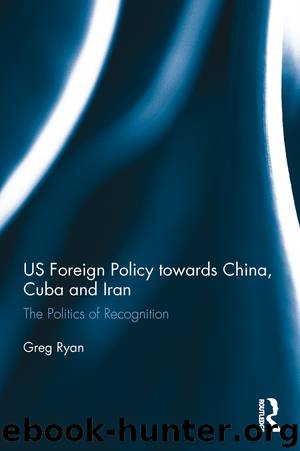US Foreign Policy Towards China, Cuba and Iran by Greg Ryan

Author:Greg Ryan
Language: eng
Format: epub
Publisher: Taylor & Francis (CAM)
Published: 2017-07-17T16:00:00+00:00
Thus, the US moved quickly to extend diplomatic recognition to Castro’s government while continuing to hope that it would be as amenable to American economic interests as previous Cuban regimes. The newly arrived (as of January 1959) American ambassador, Phillip Bonsal, a career Foreign Service officer who spoke Spanish and had previously served as ambassador to Bolivia and Colombia, was fully supportive of recognizing Castro’s government but was left in the awkward position of attempting to maintain American economic predominance in Cuba while realizing the new regime was not likely to accommodate this request.
In April 1959, just two months after seizing power, Castro visited Washington. He was not afforded an audience with President Eisenhower (who left town to play golf in Georgia), instead being granted an interview with Vice-President Nixon, again underlining the lack of seriousness of what was at stake. Castro also met with the Senate Foreign Relations committee and assured its members that US properties in Cuba would be protected by the new government. According to some accounts Castro did not ask for American aid nor was it proffered, although at this point where positions had yet to solidify, Castro might have accepted US aid if it were offered, and the US might have given it if Castro had asked.11 Alternatively, it is claimed that Castro refused ‘tentative’ pledges of American aid, but what is clear is at this point Castro did not claim to be a communist and declared his support for the Western democracies in the ideological conflict with the Soviet Union.12
However, in May Castro introduced a collectivist agricultural and land reform program known as the Agrarian Reform Law. This elicited major protests from US sugar firms in Cuba who correctly anticipated that the revolutionary government would confiscate large land holdings, thus representing a problem for US economic interests in Cuba and provoking Senator William Fulbright to conclude that the possibility of negotiating a policy of cooperation with Castro was now impossible.13 Although US policy did not oppose land reform in the abstract, and even supported it in many cases (Chiang’s KMT government on Taiwan is a notable example), in this particular instance land reform presented an acute threat to America’s perceived overriding interest in Cuba. Following the announcement of the Agrarian Reform Law, Ambassador Bonsal attempted unsuccessfully to persuade the Castro government to soften the law for US companies in Cuba. Bonsal also sought to determine at this point whether Cuba was moving towards outright communism, but found very little evidence of communist activity within the government, stating in a memorandum to Washington:
I strongly recommend that for present we continue policy of friendliness towards Castro and GOC, using our influence in every way to guide him towards sounder economic ground, and that we give no encouragement of any kind to movements aimed at overthrowing Castro. Latter is very strong as of now reflecting as he does hopes and aspirations of majority of Cubans rather than any foreign ideology.14
Download
This site does not store any files on its server. We only index and link to content provided by other sites. Please contact the content providers to delete copyright contents if any and email us, we'll remove relevant links or contents immediately.
| Anthropology | Archaeology |
| Philosophy | Politics & Government |
| Social Sciences | Sociology |
| Women's Studies |
The Secret History by Donna Tartt(18797)
The Social Justice Warrior Handbook by Lisa De Pasquale(12117)
Thirteen Reasons Why by Jay Asher(8762)
This Is How You Lose Her by Junot Diaz(6745)
Weapons of Math Destruction by Cathy O'Neil(6110)
Zero to One by Peter Thiel(5657)
Beartown by Fredrik Backman(5571)
The Myth of the Strong Leader by Archie Brown(5395)
The Fire Next Time by James Baldwin(5220)
How Democracies Die by Steven Levitsky & Daniel Ziblatt(5107)
Promise Me, Dad by Joe Biden(5067)
Stone's Rules by Roger Stone(5007)
A Higher Loyalty: Truth, Lies, and Leadership by James Comey(4819)
100 Deadly Skills by Clint Emerson(4818)
Rise and Kill First by Ronen Bergman(4676)
Secrecy World by Jake Bernstein(4615)
The David Icke Guide to the Global Conspiracy (and how to end it) by David Icke(4595)
The Farm by Tom Rob Smith(4415)
The Doomsday Machine by Daniel Ellsberg(4390)
